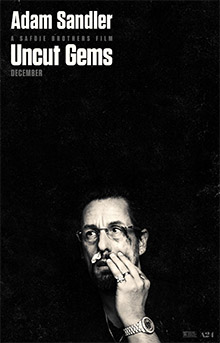New York
City jeweler Howard Ratner (Adam Sandler) has a gambling addiction, a massive
debt to his brother-in-law Arlo (Eric Bogosian), a soon-to-be-ending marriage
to Dinah (Idina Menzel), and an affair with much younger employee Julia (Julia
Fox). His associate Demany (Lakeith Stanfield) introduces him to basketball
star Kevin Garnett, who takes an immediate liking to a large uncut opal that
Howard has acquired. Soon the jeweler begins to concoct a longshot betting
scheme that will make his troubles go away, if Arlo’s goons don’t get the
better of him.
Directed
by the Safdie Brothers, Uncut Gems is kind of a throwback to a gritty
1970s crime drama albeit with more humor and a contemporary setting. These
derivations do little to enhance it, however, and it often comes across as a
reminder of how better – or at least how different – a film it could have been
if other artistic choices were made.
Sandler, a
divisive actor, is actually the least of the problems here. He does an
excellent job of embodying Howard, and the character is a bit of a departure
from his usual idiot manchild shtick. However, Howard still makes for a highly
unsympathetic protagonist. Lacking both the pathos of Mark Wahlberg in The
Gambler or the cunning and charisma of Leonardo DiCaprio in The Wolf of
Wall Street, Sandler’s take on a morally compromised protagonist is a
pushy, annoying, slimy loser. He isn’t helped by a supporting cast that leans
heavily into stereotype territory, squandering the talents of Menzel,
Stanfield, and Judd Hirsch. Amusingly, Garnett (superstitious) and The Weeknd (flirtatious
and egotistical) play less-than-flattering versions of themselves, but Fox (a
subversion of a gold-digger) and Bogosian (exasperated and put-upon despite
being the nominal aggressor) are probably the most interesting characters here.
Aesthetically,
the film sadly mistakes bustle and bombast for texture. There is an almost
constant stream of chatter, and not since Birdman’s constant drumming
has a score (by Daniel Lopatin in this case) felt so distracting and obtrusive.
The film’s closing shot consciously mirrors one of its opening shots, lazy
visual shorthand for making a thematic connection.
There are
moments of tension and excitement here, and the Safdie Brothers have obvious
vision and passion for their subject matter. However, the same holds true for
Spike Lee, whose underrated (and, in some ways, equally excess-prone) 25th
Hour suggests that a New York film about a fringe criminal confronted by
the consequences of his actions needn’t be this hard to like.

No comments:
Post a Comment